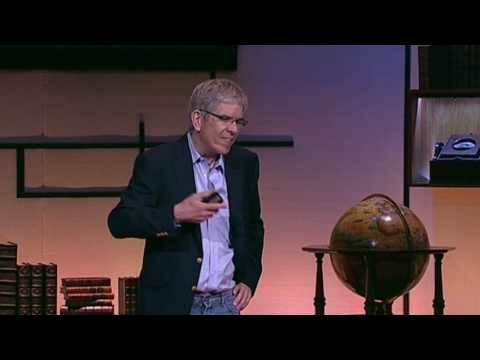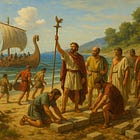Charter Cities : What If Prosperity Could Be Imported Anywhere ?
The Nobel Prize Winner's Crazy Idea That Could End Poverty
Note : This article is the 2nd in a series on how the internet and globalization are disrupting nation-states—and what new governance models may emerge. Here are the first articles in the series:
In 2009, future Nobel Prize-winning economist Paul Romer1 proposed a revolutionary idea, which he summarized in a TED talk2 :
He began by showing a photo of African students sitting in the street doing their homework by lamplight near an airport, because they had no electricity at home.
And yet, each of them had a cell phone in their pocket.

How is it possible, Paul Romer asked, that these students have access to modern technologies such as cell phones, but not to electricity, a century-old technology?
Why, indeed?
The electricity company in the African country in question operated under a rule that required it to sell electricity at a very low, subsidized price. And the price was so low that the company lost money on every unit sold. So it had neither the resources nor the motivation to connect many users.
The president wanted to change this rule so that electricity companies could make a profit, thereby encouraging them to connect more households.
But he faced strong opposition from existing customers, who wanted to keep the subsidized rates they were enjoying. So the president was stuck with rules that prevented him from adopting a win-win solution for his country. And students were still forced to study under streetlights.
Far from being unique, this situation is repeated in many developing countries: one of the reasons why so many countries find it difficult to escape poverty is that the rules in place are not the best for developing the country and improving the living conditions of its population.
Governments often struggle to change these rules because they face opposition from the people (often a vocal minority) who benefit from them.
So the idea is this: rather than changing the rules for everyone at once, why not change them in a small area, see what happens, and then extend the rules to the rest of the country if it works?
Or, better still, why not import a set of rules that have proven to be more effective than the local rules?

So, what would happen if a developing country, such as Madagascar, granted (either permanently or for a limited period, say 99 years) a portion of its uninhabited territory as a concession to a developed country, such as Canada, saying something like, ‘Canadian laws will apply here; you can build a city and anything else you want, but Malagasy people will have the right to live and work there as in any other region of our country’.”
The idea is that this will attract entrepreneurs and investors, Canadians and other nationalities, who will come to build and create, knowing they would benefit from a familiar and stable legal framework. This, in turn, would create a zone of prosperity benefiting the entire country—especially by allowing voluntary migration, as local residents could choose to move there in search of better opportunities. This could help reduce poverty and offer new opportunities to those currently living in disadvantaged conditions.
Paul Romer named this concept “charter city,” drawing on the examples of Hong Kong and Singapore.
The government of Madagascar was sufficiently interested in this concept to consider implementing it, but elections brought a new majority to power that abandoned the project.
Two years later, Paul Romer gave another TED talk, in which he outlined the progress made on this concept3, including the discussions that the Honduran government had initiated with him.
At the time, this small Central American country was seeing 75,000 of its citizens leave each year for the United States and Canada, often illegally, in search of a better life.
Officials from the Honduran government who saw Paul Romer’s TED talk thought to themselves: “Rather than seeing so many of our fellow citizens leave for these countries, why not imagine a charter city managed by the United States or Canada, which would allow prospective emigrants to obtain everything they are looking for without leaving the country?”
They began working with Paul Romer to implement his vision...
Unfortunately, a few months later, Paul Romer, dissatisfied with certain aspects of the project, decided to resign4. Shortly thereafter, the Honduran Supreme Court declared the project unconstitutional, as it placed part of the country’s territory outside its full jurisdiction5.
This seemed to put a stop to the project.
Would this idea join the vast graveyard of interesting ideas that never came to fruition?
Coming soon
In the next article, we’ll take a look at the radical vision that turned charter cities from theory into reality — a world where citizens become customers, and in which new economic and governance systems can be tested at a speed never before seen in history.
Stay tuned! In the meantime, feel free to follow Disruptive Horizons on X/Twitter & LinkedIn, and join the tribe of Intelligent Rebels by subscribing to the newsletter:
And here is the first articles in this series :
Co-recipient of the 2018 Nobel Prize in Economics for his work on endogenous growth theory.
“Why the world needs charter cities,” Paul Romer, TED, 2009.
“The world’s first charter city?“, Paul Romer, TED, 2011
“Plan for Charter City to Fight Honduras Poverty Loses Its Initiator,” Elisabeth Malkin, New York Times, 2012
“Honduran supreme court rejects ‘model cities’ idea,” Alberto Arce, AP, 2012






